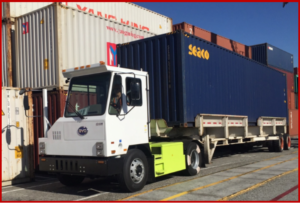
BYD all-electric yard trucks eliminate the use of diesel fuel. A typical yard truck burns 2 to 4 gallons of diesel fuel per hour.
The State of California, San Bernardino Council of Governments (SBCOG) and partners Daylight Transport and Chinese BYD Motors note the arrival of the first of 27 next-generation, zero-emission electric trucks for yard and service work in three disadvantaged communities in San Bernardino, Los Angeles and Fontana. (Diesel Coffin Nails – EVs to Takeover in SoCal Freight Yards)
Exposure to diesel exhaust, of course, can lead to serious health conditions like asthma and respiratory illnesses and can worsen existing heart and lung disease, especially in children and the elderly. These conditions can result in increased numbers of emergency room visits, hospital admissions, absences from work and school, and premature deaths. It also produces ground level ozone, a contributor to Global Warming.
U.S. truck makers are badly behind in electrification, but not surprisingly are behind diesel emission regulations that are subsidies for them. Not without self-interest, diesel engine and truck makers wrote EPA two weeks saying that the so called DERA program (diesel emissions reduction act), which offers rebates and grants to owners of diesel-powered equipment to aid in retrofitting older engines with diesel engines with lower emissions technology or in replacing older diesel equipment all together, should continue. It’s a $700 million taxpayer subsidy.
In a letter to new EPA Administrator Scott Pruitt, 20 companies and organizations rallied for the continuation of the program, arguing it “supports domestic jobs while helping to clean the air.” Clearly, electric trucks are a better answer. (https://www.epa.gov/cleandiesel/learn-about-clean-diesel)
“We estimate that almost three out of five diesel trucks and buses on the road today are more than ten years old and emit much higher levels of emissions than the vehicles using today’s technology. Without a program like DERA, these older vehicles will stay on the road until they wear out, increasing emissions that could be significantly reduced if replaced with newer technology,” said the letter. (More than 75,000 Electric Buses Will Be on Roads by 2018 or Windsor, Canada to Buy Chinese BYD Electric Buses)
The SoCal project for electric trucks represents a step toward the commercialization of heavy-duty, advanced, zero-emission technologies. The two types of electric trucks funded by the grant are the most common at every major freight location in the U.S., providing a model for truck electrification that could be scaled to any facility. CALSTART, a Pasadena-based clean transportation not-for-profit, will be evaluating the future potential for commercialization and job creation.
The demonstration electric truck project is funded by $9 million from the State’s climate change-fighting cap-and-trade program, with another $10.2 million in cash and in-kind matching funds. The project is part of California Climate Investments, a statewide program that puts billions of cap-and-trade dollars to work reducing greenhouse gas emissions, strengthening the economy and improving public health and the environment – particularly in disadvantaged communities.
“It’s exciting to see the first of these ultra-clean trucks roll off the manufacturing line in Lancaster and get to work moving cargo in Fontana,” California Air Resources Board Chair Mary D. Nichols said. “Electric trucks mean cleaner air for all Californians, especially those who live in neighborhoods close to freight transfer facilities and rail yards.”
The project establishes 23 battery-electric 80,000-pound (GCVWR) Class 8 yard trucks, and four 16,100-pound (GVWR) Class 5 service trucks. Three yard trucks and a service truck will operate at Daylight and the other 23 will operate at two BNSF Railway rail yards in San Bernardino and Los Angeles counties. BNSF will take delivery of the electric trucks this summer.
“With this project, California is proving to critics that clean air and job creation are not mutually exclusive,” said Stella Li, president of BYD Motors. “BYD is proud of its role in this project as the provider of 27 zero-emission, all-electric trucks that are coming from our manufacturing facility in the city of Lancaster, Los Angeles County. Our electric trucks are safe and reliable, and every purchase of a BYD electric truck in California helps support local job creation.”
Over the two-year duration of the demonstration project, the zero-emission trucks are expected to reduce emissions of about 3,500 tons of carbon dioxide (CO2) equivalent, 3,250 pounds of nitrogen oxide and 170 pounds of diesel soot. The Daylight Transport Service Center is a newly constructed, state-of-the-art, environmentally conscious facility. Power for the electric-vehicle chargers at the center will be generated by a 600-kilowatt solar system through net metering, which covers nearly the entire roof of the 60,000-square-foot warehouse. The electric trucks are provided by Chines maker BYD, whose North American headquarters are in Los Angeles.
The California Climate Investments cap-and-trade program also creates a financial incentive for industries to invest in clean technologies and develop innovative ways to reduce pollution. California Climate Investments projects include affordable housing, renewable energy, public transportation, zero-emission vehicles, environmental restoration, more sustainable agriculture, recycling and much more. At least 35 percent of these investments are made in disadvantaged and low-income communities. For more information, visit https://arb.ca.gov/caclimateinvestments.

